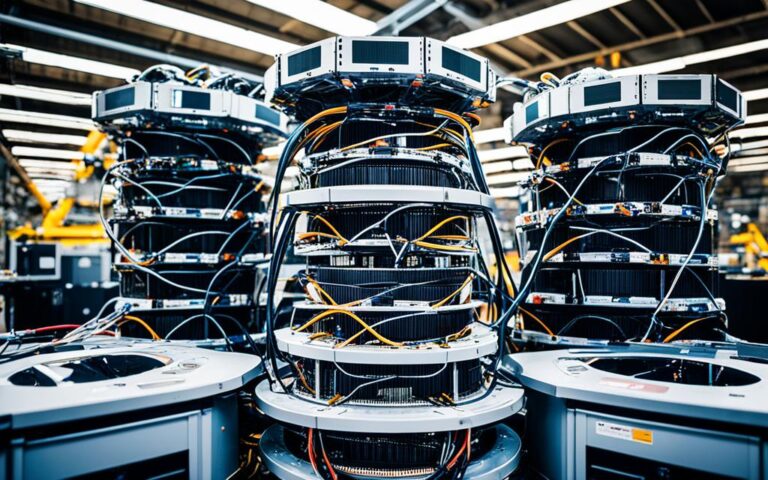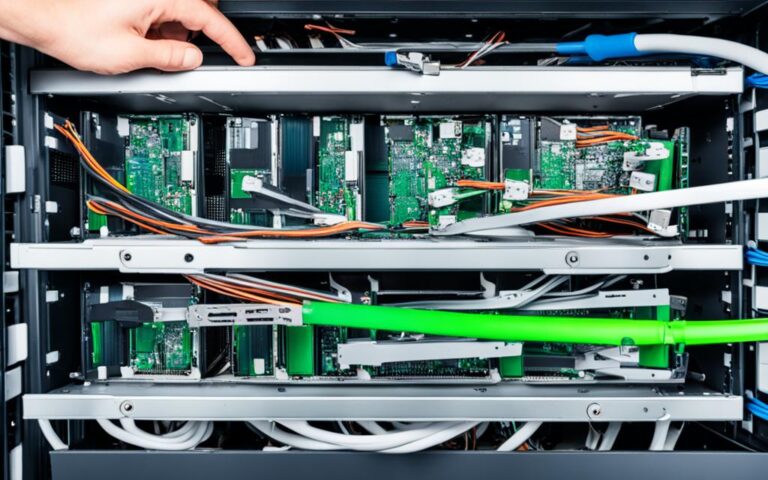How Server Recycling Can Support Local Communities
Server recycling plays a crucial role in supporting local communities and fostering sustainability in the UK. Through the government’s IT Recycling Scheme, businesses are required to help recover end-of-life products and recycle them. This scheme helps recycle 40,000 tonnes of computers, tablets, televisions, printers, and other electronic waste each year, preventing them from ending up in landfills. By participating in server recycling, individuals and organizations can play a direct role in reducing environmental harm and improving their local communities.
Why IT Recycling Is Important
IT recycling plays a vital role in promoting responsible waste management and reducing electronic waste. This has significant implications for both the environment and society as a whole.
By actively participating in IT recycling practices, individuals and businesses contribute to the preservation of natural resources and the reduction of pollution. Moreover, recycling fosters a culture of mindfulness towards consumption habits, leading to a decrease in unnecessary purchases and savings in the long run.
One of the key advantages of IT recycling is its positive impact on future generations. By recycling electronic devices, we help create a better world for our children and grandchildren, safeguarding the planet and ensuring a sustainable future.
“IT recycling is not just about disposing of old devices. It is a direct commitment to environmental protection and sustainability that each and every one of us can take part in.”
The Environmental Benefits
Recycling IT equipment reduces the need for raw materials and energy-intensive manufacturing processes, significantly decreasing carbon emissions. This leads to a reduction in the overall carbon footprint and a more eco-friendly approach to managing technology waste.
The Social Benefits
IT recycling initiatives have wide-ranging social benefits as well. By recycling and refurbishing old devices, organizations can make technology more accessible to disadvantaged communities, schools, and non-profit organizations. This helps bridge the digital divide and promotes digital inclusion, empowering individuals with equal opportunities for growth and development.
Individual and Collective Responsibility
IT recycling is not a responsibility limited to certain individuals or organizations. It is a collective effort that requires everyone’s participation. By choosing to recycle our IT equipment, we can inspire others to follow suit and create a positive ripple effect throughout society.
“Every electronic device recycled is a step towards a more sustainable future. Let’s come together and make a difference by embracing IT recycling as a part of our daily lives.”
What Can I Recycle?
Recycling is a crucial step towards preserving the environment and reducing waste. However, it’s essential to understand what materials can be recycled to ensure our efforts are fruitful. The materials accepted for recycling may vary depending on the local recycling center’s guidelines. These guidelines are designed to streamline the recycling process and maximize the recovery of valuable resources.
Different materials are categorized and assigned numbers from 1 to 7, indicating their recyclability. This classification system helps individuals identify which items can be recycled. Here’s a breakdown of the common materials and their recyclability:
| Material | Recyclability |
|---|---|
| Glass | Generally recyclable, but check with local center for specific guidelines. |
| Paper/Cardboard | Recyclable, but avoid soiled or wet paper products. |
| Plastic | Check the local center’s guidelines for acceptable types of plastic. |
| Metal (Aluminum, Steel, etc.) | Most metals are recyclable, but double-check with the center for any restrictions. |
| Electronics | Electronic waste can be recycled, including computers, laptops, phones, and other devices. Ensure safe disposal of sensitive data prior to recycling. |
It’s important to stay informed about local recycling practices, as guidelines may differ from one area to another. Checking with the nearest recycling center will provide clarity on what can and cannot be recycled in your specific location. By adhering to these guidelines, we can ensure that our recycling efforts make a real difference in reducing waste and preserving valuable resources.
The Benefits of Computer Recycling
Computer recycling offers several benefits. Firstly, it conserves natural resources by reusing various components of old computers in the production of new ones, thereby reducing the need for raw materials. Additionally, reusing old computers supports local communities by providing technology to schools, low-income families, and charities. This helps bridge the digital divide and enhances access to technology for those who cannot afford new computers. Furthermore, computer recycling can create local jobs in recycling plants, contributing to the economy and community development.
Conserving Natural Resources
Computer recycling plays a crucial role in conserving natural resources. By reusing components from old computers, manufacturers can reduce the demand for raw materials such as metals, plastics, and rare earth elements. This helps preserve natural resources and reduces the environmental impact of mining and extraction activities.
Supporting Local Communities
The reuse of old computers in local communities has far-reaching benefits. By providing technology to schools, students have access to computers and the internet, enhancing their educational opportunities and equipping them with valuable digital skills. Moreover, low-income families and charities can benefit from affordable or free computers, improving their access to information, job opportunities, and essential services.
Creating Local Jobs
Computer recycling facilities and recycling plants are essential for the proper disposal and reuse of old computers. These facilities create employment opportunities in the local area, contributing to the economy and community development. Jobs range from collection and sorting to refurbishment and recycling, offering a wide range of skilled and unskilled positions.
Reducing Environmental Impact
Computer recycling significantly reduces the environmental impact associated with electronic waste. Discarded computers contain hazardous materials such as lead, mercury, and flame retardants, which can contaminate soil, water, and air if not properly disposed of. Through recycling, these toxic materials are safely extracted and treated, preventing environmental pollution and potential harm to human health.
| Benefits of Computer Recycling | Summary |
|---|---|
| Conserves natural resources by reusing computer components | Reduces the need for raw materials |
| Supports local communities | Provides technology to schools, low-income families, and charities |
| Creates local jobs | Contributes to the economy and community development |
| Reduces environmental impact | Prevents pollution from hazardous materials |
What is Server Recycling?
Server recycling involves outsourcing the recycling of leftover servers to a commissioned company. This process ensures the proper disposal of servers and the extraction of useful materials for the construction of new equipment. Server recycling is necessary because decommissioned servers contain toxic materials and chemicals that can harm the environment if not handled properly. Selling used servers to users or companies that specialize in secure disposal is an effective way to recycle and reuse servers.
The Importance of Proper Server Disposal
When it comes to server disposal, it is crucial to prioritize proper handling and recycling. Old servers contain hazardous substances such as lead, mercury, and cadmium, which can pollute the environment if not appropriately managed. By utilizing dedicated server recycling services, businesses and individuals can ensure these toxic materials are safely removed and disposed of, reducing the impact on our planet.
“Proper server recycling helps protect the environment, prevent pollution, and promote a sustainable future for generations to come.”
Moreover, server recycling allows for the extraction of valuable resources that can be repurposed and used in the production of new equipment. This reduces the demand for new raw materials, conserves natural resources, and minimizes the energy and carbon emissions associated with manufacturing.
The Process of Server Recycling
The process of server recycling involves the following steps:
- Collection: Unused or decommissioned servers are collected from businesses and individuals.
- Transportation: The servers are transported to a specialized facility equipped to handle server recycling.
- Disassembly: The servers are disassembled, and the various components are separated.
- Extraction: Valuable materials such as precious metals, circuit boards, and hard drives are extracted from the servers.
- Recycling: These materials are sent to recycling centers where they can be processed further and used in the production of new equipment.
- Secure Disposal: Any remaining hazardous materials are properly disposed of to prevent environmental contamination.
By following this process, server recycling ensures that servers are disposed of safely and responsibly, minimizing their environmental impact and facilitating the reuse of valuable resources.
Toxins and Environmental Hazards of Decommissioned Servers
Decommissioned servers, like other electronics, contain toxic materials and chemicals used in their manufacturing. Improper disposal of these servers can lead to pollution and environmental harm. Materials such as beryllium, lead, mercury, cadmium, and chromium pose a threat to both the land and human health. Even seemingly safe materials like copper and iron can be poisonous if they leak into the water supply.
Responsible disposal of decommissioned servers is crucial to prevent these toxins from contaminating the environment.
When servers are not properly recycled, they often end up in landfills where they release harmful substances into the soil and water. These toxins can seep into rivers, lakes, and groundwater, posing risks to aquatic life and potentially entering the food chain.
Furthermore, the improper handling of servers during disposal can expose workers to hazardous materials, leading to long-term health effects.
Environmental Impacts of Decommissioned Servers
Decommissioned servers, if not handled correctly, can contribute to various environmental hazards:
- Soil Pollution: Toxic materials from servers can penetrate the soil, contaminating it and impacting plant growth. This can disrupt ecosystems and endanger biodiversity.
- Water Pollution: When servers are not disposed of properly, the toxins they contain can leach into water sources, polluting rivers, lakes, and groundwater. This contamination can harm aquatic life and compromise drinking water quality.
- Air Pollution: Burning decommissioned servers or exposing them to high temperatures can release harmful chemicals into the air, contributing to air pollution and causing potential respiratory problems.
- Climate Change: The improper disposal of servers may contribute to climate change due to the release of greenhouse gases during the decomposition process. These gases, such as carbon dioxide and methane, contribute to global warming.
Proper Disposal and Recycling of Decommissioned Servers
To mitigate the environmental hazards associated with decommissioned servers, it is crucial to prioritize proper disposal and recycling. This involves:
- Ensuring that servers are recycled through reputable and certified electronic waste recycling facilities.
- Following guidelines provided by these facilities for the safe disposal of servers.
- Separating hazardous materials from servers and sending them to specialized recycling centers.
- Recovering valuable materials and components from decommissioned servers for reuse in the production of new equipment.
Environmental Hazards of Decommissioned Servers
| Hazardous Material | Environmental Impact |
|---|---|
| Beryllium | Poisonous to aquatic life and can cause respiratory problems. |
| Lead | Poisonous to humans and wildlife, and can contaminate soil and water sources. |
| Mercury | Poisonous to humans, can pollute waterways, and accumulate in the food chain. |
| Cadmium | Can contaminate soil, water sources, and food, posing health risks to humans and animals. |
| Chromium | Poisonous to humans and wildlife, and can harm aquatic environments. |
| Copper | Can pollute water sources, posing risks to aquatic life and potentially entering the food chain. |
| Iron | Can be poisonous if it leaks into the water supply, affecting both humans and aquatic life. |
Advantages of Server Recycling
Server recycling offers several advantages in terms of sustainability, resource conservation, environmental protection, and energy efficiency.
- Rare metal recovery: One of the significant advantages of server recycling is the retrieval and reuse of rare metals used in servers. These metals can be reclaimed and utilized in the production of new equipment, minimizing the need for extracting raw materials. This process helps preserve valuable resources and reduces the environmental impact of mining activities.
- Reuse of materials: Decommissioned servers contain various reusable materials that can be extracted and repurposed. By recycling servers, these materials can be given a second life, significantly reducing the demand for new resources. This aspect of server recycling contributes to a circular economy, promoting sustainability and reducing waste.
- Proper disposal of hazardous chemicals: Servers often contain hazardous chemicals such as lead, mercury, and cadmium. Through server recycling, these chemicals can be disposed of properly, preventing them from polluting the environment. This environmentally responsible approach helps safeguard ecosystems, wildlife, and human health.
- Energy efficiency and pollution reduction: Server recycling is an energy-efficient process that requires fewer resources and consumes less energy compared to the production of new servers. By recycling servers, we can reduce the carbon footprint associated with manufacturing, transportation, and extraction of raw materials. This leads to a significant reduction in pollution and greenhouse gas emissions.
By embracing server recycling, individuals and organizations can contribute to a more sustainable future, conserve resources, protect the environment, and reduce their carbon footprint.
Conclusion
Server recycling is a sustainable and eco-friendly solution that holds numerous benefits for both the environment and local communities. By participating in server recycling, individuals and organizations play a significant role in reducing electronic waste and preventing the release of harmful toxins into the environment.
In addition, server recycling contributes to the creation of new job opportunities, as recycling plants require workers to handle the disposal and extraction processes. This not only supports the local economy but also fosters community development.
Furthermore, server recycling helps conserve natural resources by reusing valuable components from decommissioned servers in the production of new equipment. This reduces the demand for raw materials and minimizes the ecological footprint of technological advancements.
To actively contribute to the green movement and support local communities, individuals and businesses can partner with reputable server recycling companies like Ecogreen. These companies specialize in secure IT disposal and computer recycling, ensuring that the recycling process is carried out safely and efficiently.
FAQ
How does server recycling support local communities?
Server recycling plays a crucial role in supporting local communities by providing technology to schools, low-income families, and charities. This helps bridge the digital divide and enhances access to technology for those who cannot afford new equipment.
Why is IT recycling important?
IT recycling is important because it encourages responsible waste management, reduces electronic waste, and contributes to worldwide environmental protection. It also helps create a better world for future generations.
What materials can I recycle?
The materials that can be recycled depend on the local recycling center’s guidelines. It’s important to check with the center to determine what can and cannot be recycled. This information will help ensure the right disposal containers are used and make recycling efforts fruitful.
What are the benefits of computer recycling?
Computer recycling conserves natural resources, supports local communities by providing technology to schools and charities, and creates local jobs in recycling plants. It also helps bridge the digital divide and enhances access to technology for those who cannot afford new computers.
What is server recycling?
Server recycling involves outsourcing the recycling of leftover servers to a commissioned company. This ensures the proper disposal of servers and the extraction of useful materials for the construction of new equipment.
What are the environmental hazards of decommissioned servers?
Decommissioned servers contain toxic materials and chemicals, such as beryllium, lead, mercury, cadmium, chromium, copper, and iron. Improper disposal of these servers can lead to pollution and harm the environment and human health.
What are the advantages of server recycling?
Server recycling offers several advantages. It conserves natural resources by reusing rare metals used in servers and reduces the demand for new resources. It properly disposes of hazardous chemicals found in servers, saves energy, and reduces pollution by requiring less energy and raw materials than producing new servers.
How can I get involved in server recycling?
To get involved in server recycling and support local communities, individuals and businesses can reach out to server recycling companies like Ecogreen, who specialize in secure IT disposal and computer recycling.















